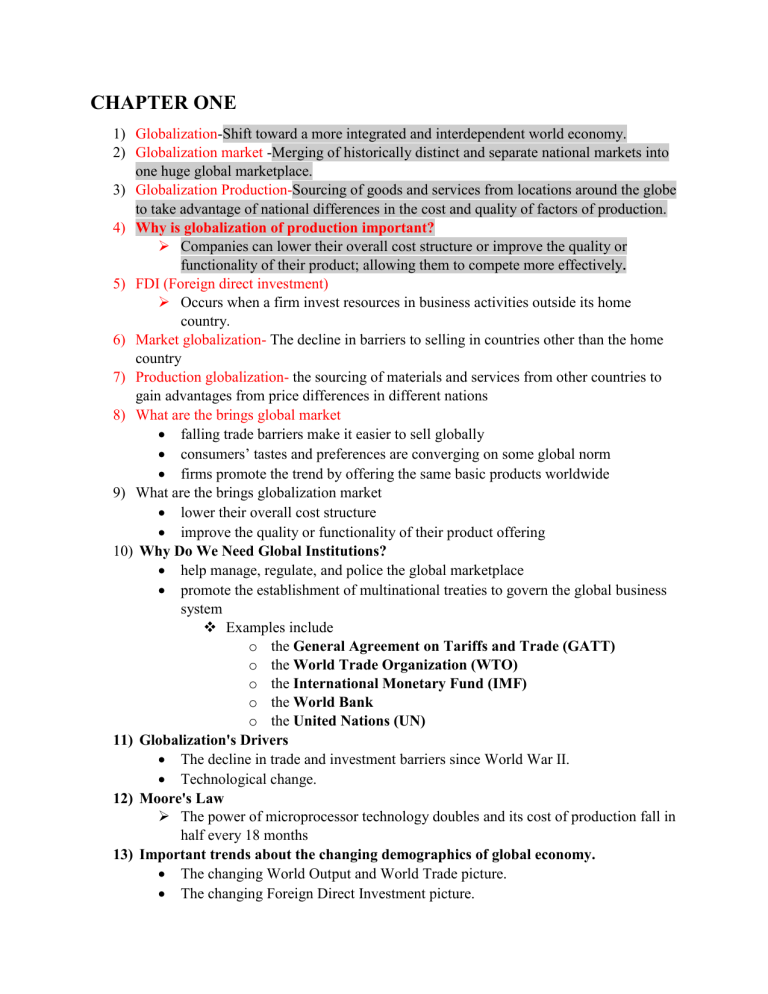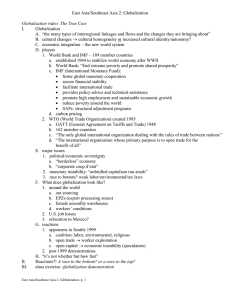
CHAPTER ONE 1) Globalization-Shift toward a more integrated and interdependent world economy. 2) Globalization market -Merging of historically distinct and separate national markets into one huge global marketplace. 3) Globalization Production-Sourcing of goods and services from locations around the globe to take advantage of national differences in the cost and quality of factors of production. 4) Why is globalization of production important? Companies can lower their overall cost structure or improve the quality or functionality of their product; allowing them to compete more effectively. 5) FDI (Foreign direct investment) Occurs when a firm invest resources in business activities outside its home country. 6) Market globalization- The decline in barriers to selling in countries other than the home country 7) Production globalization- the sourcing of materials and services from other countries to gain advantages from price differences in different nations 8) What are the brings global market falling trade barriers make it easier to sell globally consumers’ tastes and preferences are converging on some global norm firms promote the trend by offering the same basic products worldwide 9) What are the brings globalization market lower their overall cost structure improve the quality or functionality of their product offering 10) Why Do We Need Global Institutions? help manage, regulate, and police the global marketplace promote the establishment of multinational treaties to govern the global business system Examples include o the General Agreement on Tariffs and Trade (GATT) o the World Trade Organization (WTO) o the International Monetary Fund (IMF) o the World Bank o the United Nations (UN) 11) Globalization's Drivers The decline in trade and investment barriers since World War II. Technological change. 12) Moore's Law The power of microprocessor technology doubles and its cost of production fall in half every 18 months 13) Important trends about the changing demographics of global economy. The changing World Output and World Trade picture. The changing Foreign Direct Investment picture. 14) 15) 16) 17) 18) 19) 20) 21) 22) 23) 24) 25) The changing Nature of the Multinational Enterprise. The changing World Order. International Business any firm that engages in international trade or investment General Agreement on Tariffs and Trade (GATT) International treaty that committed signatories to lowering barriers to the free flow of goods across national borders and led to the World Trade Organization. World Trade Organization (WTO) Organization that succeeded the GATT as a result of the successful completion of the Uruguay Round of GATT negotiations International Monetary Fund (IMF) International institution set up to maintain order in the international monetary system. World Bank International institution set up to promote economic development. United Nations (UN) maintain international peace and security, develop friendly relations among nations and cooperates in solving international problems and in promoting respect for human rights. 2 factors have led to the growth of globalization decline in trade barriers changes in technology (internet) What has been formed as a result of the growth of globalization? international businesses and multinational enterprises 2 major trade agreements that fueled globalization General Agreement on Tariffs and Trade (GAFF) World Trade Organization (WTO) 2 sources of funding to engage in international trade International Monetary Fund (IMF) World Bank What are the implication of technology change for the globalization production Lower transportation cost: Make geographically dispersed production system more economical Allow firms to better respond to customer demands What are the implication of technology change for the globalization market Low cost communication network helps create electronic global market place CHAPTER 2 4 types of political systems Individualism- Collectivism- stresses the needs of society as a whole - those needs are more important (ex: socialism) Democracy Totalitarianism Socialism - a system that is characterized by public ownership of key industries and private ownership of less vital industries 2 other types of collectivism created by socialism Communism social democracy communism - all productive resources are publicly owned social democracy - socialism is voted in by the people Individualism - a system based on the belief that individuals should have both economic and political freedom such as free market system Democracy - a system in which the government is formed by the people through electing representatives; Also known as a representative democracy Totalitarianism - a system in which all constitutional guarantees are denied to all citizens 4 types of totalitarianism 1)communist - denies all civil liberties 2) theocratic - govern according to religion 3) tribal - govern based on representing a certain tribe 4) Right-wing - allows some economic freedom as long as it doesn't lead to communism 3 types of economies 1)market economy - all productive resources are privately owned 2) command economy - all productive resources are publicly owned 3) mixed economy - there is both market freedom and government control legal system - a system of rules and laws that regulate behavior and provides a process of grievances The legal system is important to globalization because it defines 2 things 1)the manner in which business transactions are to be executed 2) the rights and obligations of those involved in business transactions 3 types of legal systems 1)common law - laws that are based on traditional, precedent, and customs. They are unwritten laws that are depended on court interpretations (ex: common law marriage) 2) civil law - a detailed set of laws that are organized into codes. They are written, and therefore, require the courts to apply the law according to the code (ex: perjury in court) 3) theocratic law - laws that are based on religious teachings. Islamic law is the most widely practiced theocratic legal system What's the difference between common law and civil law? common law = contracts are drafted in a very detailed manner with all contingencies in order to reduce court interpretations civil law = contracts are drafted according to civil code 3 common conflicts that exist between nations 1)property rights 2) intellectual property rights 3) product safety property rights - the legal rights over the use to which a resource is put and over the use made of any income that may be derived from that resource Property rights can be violated in 2 ways 1)private action - theft, piracy, blackmail by private individuals or groups (Lord of the Rings story) 2) public action - the violation of property rights by public officials. They can occur either legally (taxes, licenses, permits) or illegally (bribes, corruption) (dance studio student story) Foreign Corrupt Practices Act a law that prohibits bribing a foreign government official or maintain a business advantage over which that foreign official has authority (created in the 1970s) Intellectual property property that is the product of intellectual activity Intellectual property rights are governed in 3 ways 1)patents - grants the inventor of a new product or process exclusive rights for a defined period of time, usually 20 years 2) copyrights - the exclusive right to publish and disperse one's work as they see it, normally 50 years 3) trademark - the exclusive ownership of a design, name, or symbol, that's officially registered to differentiate their products, normally 99 years product safety laws laws that set certain safety standards to which products must adhere. Include both civil and criminal product liability product liability holding a business responsible for its product causing injury, death, or damage





